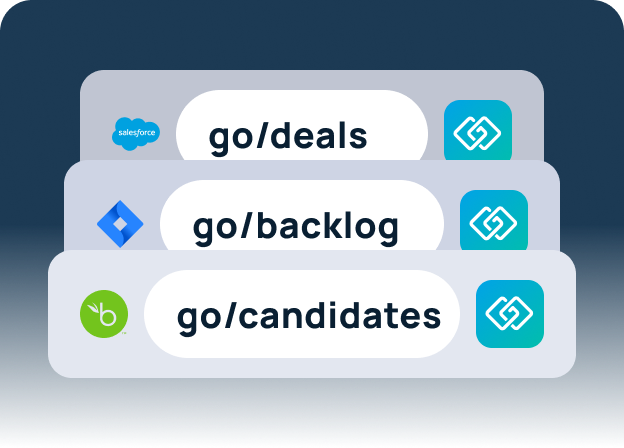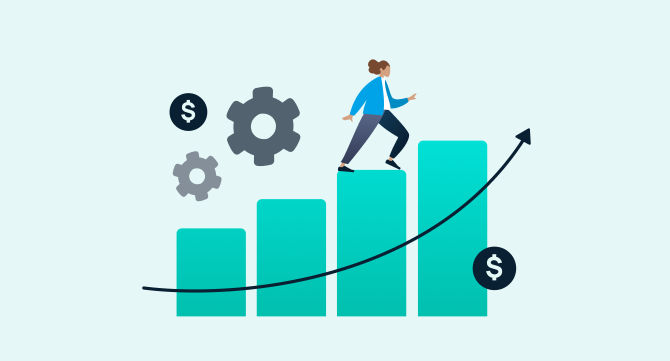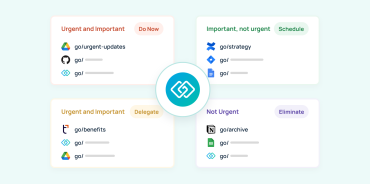If you work in sales, chances are that you’ve been feeling the squeeze lately.
On the one hand, a tougher fundraising environment has meant that sales teams are expected to do more with less. On the other, the recent economic downturn has meant that many prospects’ budgets have been slashed, and fewer leads are even receptive to a conversation.
For many sales teams, that’s unfortunately meant a dip in win rates, even if their sales activities have remained high.
On the bright side, though, it’s not all bad news for sales teams. Along with the recent challenges sales teams have faced, there have also been some positive developments, such as the birth of new technologies (hello, ChatGPT!) that can help sales teams navigate this daunting new environment.
Below, we’ll explore multiple ways that sales teams can adapt to increase sales productivity and improve their performance — from adopting artificial intelligence (AI) in their workflows to rethinking their day-to-day sales processes.
Embracing new AI technology to improve sales performance
Did you know that by 2025, Gartner predicts that 75% of B2B organizations will add AI into their sales playbooks?
There’s a good reason for that. According to McKinsey researchers, early adopters of AI have reported seeing their leads and appointments increase by over 50%. Of course, while not every organization will see results like that, they’ll still likely see positive impacts to their sales numbers. This is largely due to AI’s extraordinary ability to help sales teams:
- Automate routine tasks
- Identify new leads
- Write emails
- Analyze customer interactions
- Forecast sales
With the help of AI, sales teams can take back their time and focus their efforts on what really moves the needle: selling.
3 AI-powered sales tools to use to improve productivity
ChatGPT, a conversational AI language model, was only released in November 2022. However, since then, countless companies have integrated with this groundbreaking new technology to improve the way sales teams operate. Below, we’ll look at three ChatGPT-based sales tools that have emerged over the last six months that help streamline, automate, and augment sales teams’ work.
1. GoLinksGPT
Did you know that the average employee wastes 59 minutes a day searching for information within their company? Often, that hour can be spent pinging a coworker in Slack, digging through files and apps, or sifting through old emails to find the right PDF, case study, or testimonial.
GoLinksGPT aims to solve that problem. GoLinksGPT is built on top of GoLinks, a link manager that makes it easy for team members to find, access, and share resources using intuitive, memorable short links (for instance, replacing a long Google Drive URL with simply “go/casestudies”).

While GoLinks can be easily searched for within a GoLinks dashboard, GoLinksGPT makes it even easier for team members to find the information they need. Rather than having to search the database for a link (or Slack a team member for a GoLink), team members can simply ask GoLinksGPT a question — within the GoLinks dashboard or Slack — and immediately be served up a list of useful GoLinks.
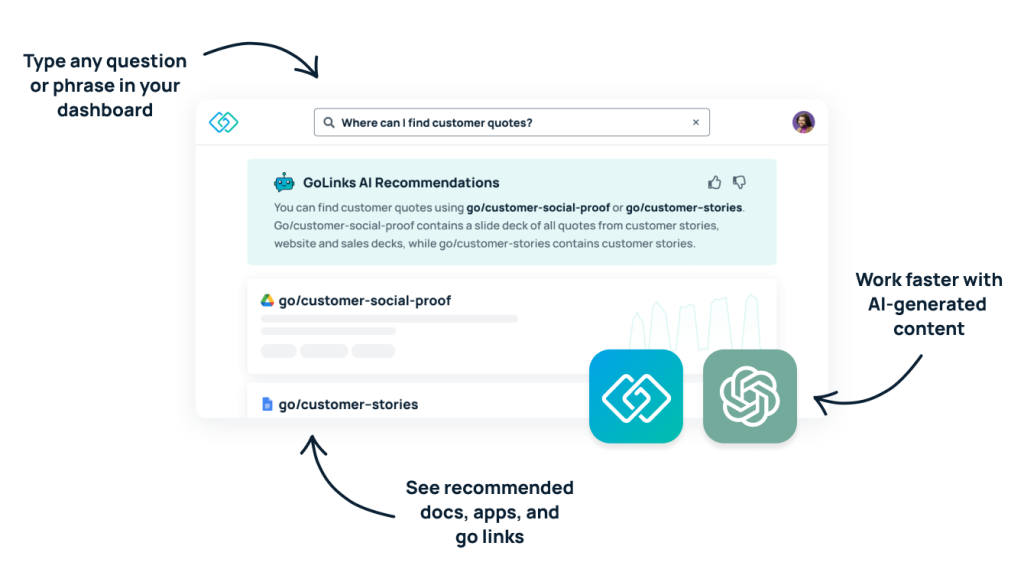
This means sales team members can easily find and access case studies, customer quotes, training materials, and other resources in seconds — without having to bother other teammates or spend time searching.
2. Copy.ai
Close to half of all sales development leaders cite messaging as their biggest work challenge. Considering that the average sales development representative (SDR) sends hundreds — if not thousands — of cold messages a month, this is an area that’s ripe for AI improvement.
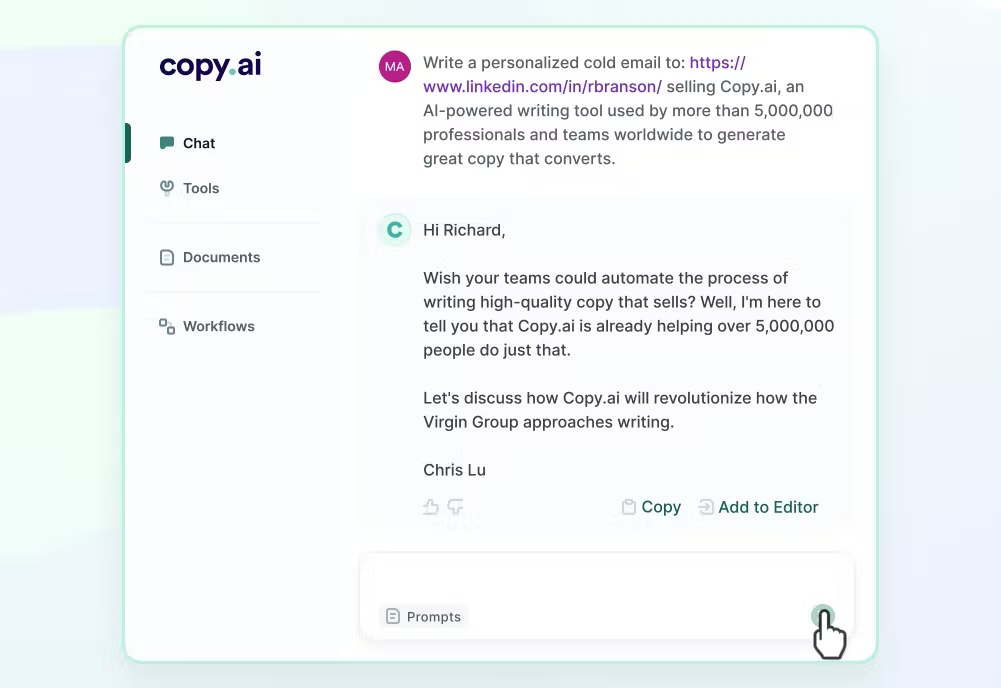
Copy.ai is one company that’s helping sales teams automate (and improve) their cold outreach. Using ChatGPT’s natural language processing, Copy.ai allows sales teams to generate personalized, effective sales outreach in mere minutes. And since Copy.ai integrates with various customer relationship management (CRM) tools, that outreach can often be automated altogether — saving sales teams hours of messaging every week.
3. Einstein GPT
If your organization is one of the many companies already relying on Salesforce as its CRM, consider increasing your sales team’s productivity with Einstein GPT, Salesforce’s in-house, ChatGPT-based conversational intelligence tool.
Einstein GPT integrates with Salesforce to pull key insights from customer sales calls and deliver helpful relationship information to sales reps. Einstein GPT also delivers automated deal insights and predictive forecasts, so that sales reps can focus their efforts on their most promising prospects.
Revamping sales teams’ processes to improve productivity & performance
Of course, integrating AI into your sales team’s workflow isn’t the only way to improve sales productivity. You can also use several other strategies to improve sales performance, such as experimenting with new workflows, investing in training, boosting collaboration, and optimizing your tech stack.
Experiment with agile methodologies
Most of the time, when people talk about agile methodologies, they’re referring to software development workflows — but over the last few years, agile methodologies have been adopted across multiple departments and teams. It’s a way of working that prioritizes quickly adapting to changing market conditions, feedback, and customer needs.
Generally, when teams adopt agile methodologies, they’ll work in short, two-week sprints that focus on achieving a predetermined list of goals. During the sprint, the team will connect every morning to talk about their progress and work through any challenges during a quick stand-up meeting. At the end of each sprint, the team gathers feedback, shares their results, and crafts their next set of short-term goals.
By working in short sprints and focusing on continuous improvement, teams can iterate on their sales strategies and tactics more readily — keeping them flexible even as the market changes and customer needs shift.
Invest in training & development
Generally, when sales slow down, the last thing a sales team will want to do is focus on training and development. And yet, as the saying goes: “Insanity is doing the same thing over and over and expecting different results.”
If sales have slowed, it may be prime time for your team to refresh their training on the latest trends and technologies in their industry, as well as on any products or services that they’re selling. It’s also critical to ensure that, as your sales reps adopt new tools, sales enablement resources, or processes, that they understand exactly how to wield these in their day-to-day work.
Improve cross-departmental dollaboration
At first glance, it may seem like cross-departmental collaboration has little to do with increasing sales productivity. However, when departments communicate inefficiently, it ends up costing all employees a significant amount of time — including your sales team. In fact, thanks to poor collaboration, the average employee spends an average of six hours a week recreating work that already exists.
Improving communication and collaboration between departments can look like:
- The marketing team involving the sales team more heavily in the creation of sales enablement resources like blog posts, e-books, and case studies — leading to the creation of more effective materials overall.
- The product team communicating updates more proactively, so that sales reps can use that information in calls with customers.
- The customer success team letting the sales team know when certain customers are primed for an upsell or at risk of churning — helping the sales team capture more opportunities.
So, how can you improve collaboration? Chances are you’re already using most of the popular tools embraced by hybrid teams, such as Slack and Zoom. But consider adopting other collaboration tools, such as:
- A project management tool like Trello, which can give teams added visibility into each others’ daily workflows, processes, and workloads.
- A knowledge base tool like Notion, which can make it easier for teams to document and share knowledge company-wide.
- A revenue intelligence tool like Gong, which lets teams like sales, customer experience, and marketing turn customer interactions into actionable insights.
- A link management platform like GoLinks, which makes it easier for employees to find, share, and disseminate resources across teams using intuitive short links.

Optimize your tech stack
While tools can help you achieve your sales goals, it’s important not to overload your team with too many apps, either. After all, according to the Salesforce State of Sales survey, two-thirds of sales reps report that they’re already “drowning” in tools.
Strike the right balance by auditing and optimizing your existing tech stack. That means taking a solid look at the tools your team currently uses, and asking:
- Which apps are being underutilized, and why?
- What tools are team members using most on a day-to-day basis?
- Where are sales reps spending the most time doing manual or repetitive tasks?
- Are there any areas where tech could be helping us, but isn’t yet?
Using a SaaS spend management tool like GoLinks can help you conduct an accurate audit, as it gives you full visibility into app usage across your organization. This can give you a clearer picture of which apps are indispensable to your team’s productivity, and which are simply bloating your tech stack (and draining your software budget).
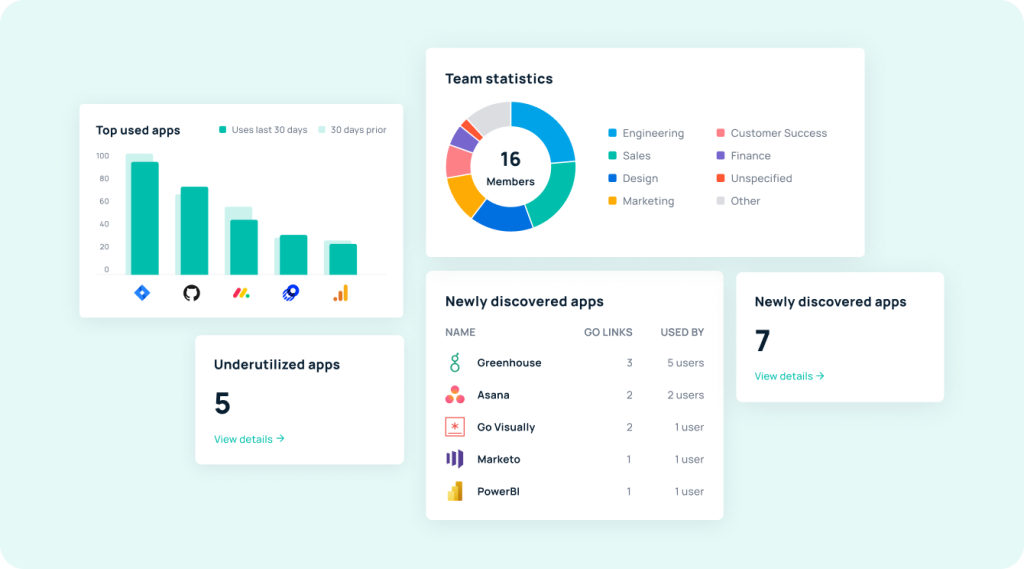
Remain flexible & adaptive as you navigate new sales challenges
With the recent economic downturn, sales managers and their teams are facing unpredictable times. However, if teams can remain adaptive and innovative, they can more easily navigate the changing environment.
To learn more about how GoLinks can help your team improve collaboration and increase productivity, schedule a demo with our team today.
Access and share resources instantly with GoLinks
Schedule a demo